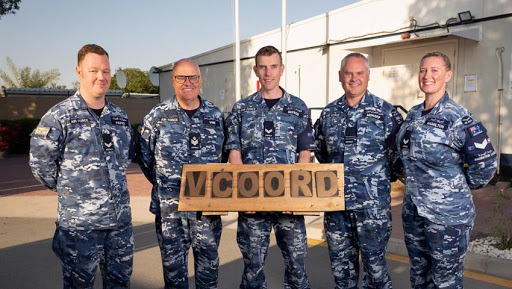Like all international travellers, Australian Defence Force personnel and Defence civilians deploying to the Middle East are subject to each nation’s immigration policies. Managing the visa requirements of the hundreds of ADF personnel who transit through the main operating base in the Middle East region (MER) every year is a complex job.
To continue reading the rest of this article, please log in.
Create free account to get unlimited news articles and more!
RAAF's five-member team, known as VCOORD, are a "mixed-bag" of specialists, drawn from a variety of musterings. The acronym stands for Visa Coordination Cell, and acts in support of JTF 633. The team is responsible for ensuring the smooth transition of ADF members deployed to the Middle East; which, as of writing, stands at about 1,200.
Flight Sergeant Russell Vine is the VCOORD second-in-command, overseeing the small team that provides the essential immigration support.
“Our role is complex and demands quick decision-making to ensure ADF personnel transit smoothly through to their destination. It’s hard work but it is rewarding to get the job done,” FSGT Vine said.
“It takes a diverse team with a wide range of skills to make what we do happen in theatre.”
Corporal Alyssa Hamilton, a personnel capability specialist, deployed into the role in October.
“VCOORD assists with moving all ADF members into and out of the MER and we have the pleasure of seeing all members at least twice throughout their deployment,” CPL Hamilton said.
“We have a three-week handover for our role. It is the longest of any job in the MER, and that says a lot for the complexity involved."
“There is not a job like this back in Australia, so it has definitely been a steep learning curve, particularly with the regular arrival and departure of the Military Air Sustainment Service flights.”
CPL Hamilton said apart from mastering the process of getting personnel in and out, people skills were essential because of the close relationship between the host nation and the VCOORD staff.
“A good relationship between us and the local staff is important, it enables a smooth transition in and out of the country,” she said.
“The host nation staff are great to deal with. They offer traditional Arabic coffee and good conversation when we are on the job.”

 Login
Login







